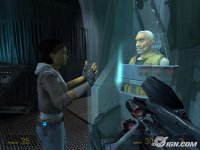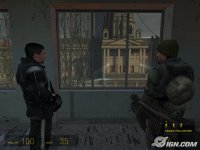The facial anima
 tions and voice acting in the game are spectacular, there's no question about that, and this makes it all the more unfortunate that Valve kept a silent Gordon Freeman as the player character. Alyx, Barney, even Dr. Breen all have engaging, emotional chats with Gordon, yet due to the game's signature mute style, Gordon doesn't respond at all. While this worked well in the original Half-Life, the depth of the conversations weren't nearly as, well, deep. In Half-Life, Gordon wasn't attached to anyone in particular, he was mainly encountering random scientists and security guards for brief periods, however this all played well for the purposes of that game; it was believable. Half-Life 2, however, carries on the same style but with reoccurring supporting characters who are acting like one would in a true dramatic narrative. Trying to get an emotional attachment between characters when the lead doesn't even respond or carry his weight in the conversation is, in my opinion, a major blow to Half-Life 2. How can I care about Alyx's fate, for example, if the only thing I have to go on are a bunch of one-sided conversations? No matter how strong her voice acting is and how realistic her model's facial expressions are, I can't empathize with her when there's no real character interaction.
tions and voice acting in the game are spectacular, there's no question about that, and this makes it all the more unfortunate that Valve kept a silent Gordon Freeman as the player character. Alyx, Barney, even Dr. Breen all have engaging, emotional chats with Gordon, yet due to the game's signature mute style, Gordon doesn't respond at all. While this worked well in the original Half-Life, the depth of the conversations weren't nearly as, well, deep. In Half-Life, Gordon wasn't attached to anyone in particular, he was mainly encountering random scientists and security guards for brief periods, however this all played well for the purposes of that game; it was believable. Half-Life 2, however, carries on the same style but with reoccurring supporting characters who are acting like one would in a true dramatic narrative. Trying to get an emotional attachment between characters when the lead doesn't even respond or carry his weight in the conversation is, in my opinion, a major blow to Half-Life 2. How can I care about Alyx's fate, for example, if the only thing I have to go on are a bunch of one-sided conversations? No matter how strong her voice acting is and how realistic her model's facial expressions are, I can't empathize with her when there's no real character interaction.Motivation. In Half-Life, Gordon's motivation for almost the entire game was simple survival, and
 everything he did and everyone he encountered were geared towards that end and that end alone. It fit, it was realistic to the game world, and everything had purpose. So what was Gordon's purpose in Half-Life 2? At the beginning of the game, it's the same as in Half-Life, to simply survive and everything caters itself well to this. However once Gordon escapes from Ravenholm, really, what was his motivation? It certainly wasn't survival anymore, as he embarks on a series of rescue missions and ultimately leads a civil rebellion simply because misc. resistance member whomever tells him so. Is that any realistic motivation to the character who, for a game and a third was focused solely on survival? Does this make sense for someone who is not a soldier but rather a theoretical physicist in a nice suit of body armour? No, it doesn't. Another failing of Half-Life 2's believability.
everything he did and everyone he encountered were geared towards that end and that end alone. It fit, it was realistic to the game world, and everything had purpose. So what was Gordon's purpose in Half-Life 2? At the beginning of the game, it's the same as in Half-Life, to simply survive and everything caters itself well to this. However once Gordon escapes from Ravenholm, really, what was his motivation? It certainly wasn't survival anymore, as he embarks on a series of rescue missions and ultimately leads a civil rebellion simply because misc. resistance member whomever tells him so. Is that any realistic motivation to the character who, for a game and a third was focused solely on survival? Does this make sense for someone who is not a soldier but rather a theoretical physicist in a nice suit of body armour? No, it doesn't. Another failing of Half-Life 2's believability.Finally, there's a great quote in Half-Life 2: Raising the Bar on page 278 from Doug Wood of Valve:
"As players fought their way through the street-war maps, we wanted to make sure they knew what they were fighting for. We decided to add a scene with citizens pulling down a monitor while Breen was making a speech."
So basically, V
 alve is saying they needed to remind the player of the game's supposed central theme, one of rebellion and liberation against oppressors, in the final quarter of the game. If you need to remind your audience of the central theme that far into a story, than really, your story isn't that strong to begin with, it lacks clarity and attachment.
alve is saying they needed to remind the player of the game's supposed central theme, one of rebellion and liberation against oppressors, in the final quarter of the game. If you need to remind your audience of the central theme that far into a story, than really, your story isn't that strong to begin with, it lacks clarity and attachment.The above are things that concern me for the upcoming episodic expansions for the Half-Life series. Episodic television, for example works so well because it hooks people into a continuing story and unique characters, so you keep tuning in to see what happens next. When a plot is as weak as Half-Life 2's, do I really care and want to wait for tidbit after tidbit, hoping the next scrap of info will actually reveal some deep info into the game's story? The answer is no, no I don't at all.



No comments:
Post a Comment